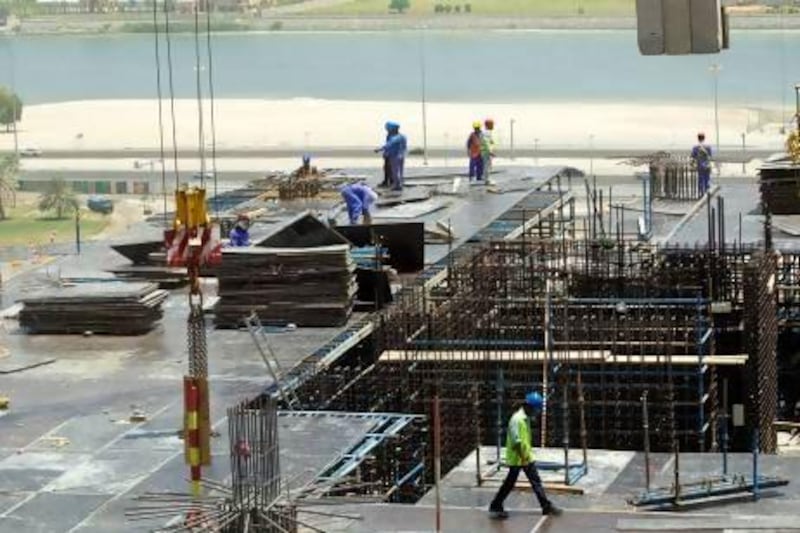ABU DHABI // Illiterate labourers will be the focus of a construction-site safety campaign aiming to cut down on deaths and injuries across the city.
The campaign, to tour the capital next month, includes illustrated posters that highlight the 16 biggest hazards at construction sites, and a mobile training centre where workers can watch a video reinforcing safety messages.
The campaign will visit 10 large projects, with plans to visit smaller ones later in the year, as part of the a municipality initiative.
In 2011, the first year for which statistics were kept, the municipality recorded 29 accidents at construction sites, 10 of them fatal.
The campaign is being organised by the environment, health and safety (EHS) division of the municipality and will take place during the last week of April.
The municipality already conducts site inspections and workshops for contractors, consultants and developers, but this campaign will improve safety even further, said Mohammed Al Houssani, the head of inspection and monitoring at EHS.
"The campaign will improve the safety awareness and, when the awareness is improved, for sure it will reduce the incidents," Mr Al Houssani said.
Among the 16 "top hazards" depicted on the posters are overloaded vehicles and forklifts, unstable mobile cranes, fire, unsafe working platforms and unsafe scaffolds.
The posters will also be produced in seven different languages, including Urdu, Hindi, Malayalam and Chinese.
EHS has 10 engineers who inspect sites in Abu Dhabi city.
Click on the image below for the 16 biggest hazards
To obtain a building permit, companies must submit an environment, health and safety plan for approval by the municipality, then the EHS engineers must ensure the rules are adhered to during construction.
"We are looking at the implementation, not just the documents," said Mr Al Houssani. "They have a target each day to visit three construction sites for each engineer."
Offenders face fines of between Dh1,000 and Dh50,000.
From May 2010 until December 31 last year, a total of 3,474 separate construction projects were inspected by EHS and 126 fines were issued.
Unsafe scaffolding resulted in 13 fines, the highest number of any category, and most of the improvement notes, which are issued as the step before fines are imposed, Mr Al Houssani said.
Abdulaziz Zurub, director of EHS, said unsafe scaffolding was the main problem on construction sites, and another poster relates specifically to it.
Mr Zurub, who established EHS in May 2010, said there had been improvement in building-site safety since then but there was more work to do.
In January last year a scaffolding accident that killed a labourer on a construction site in Abu Dhabi was found to be caused by substandard equipment, improper supervision, negligence and strong winds.
Investigating municipality inspectors noted more than 20 offences at the site near the Euro Hotel on Muroor Road.
Five men fell when the improperly erected scaffolding collapsed on January 20.
An Indian worker standing below the structure was killed because he "was not able to run/move out from his present location due to abrupt and sudden collapse of scaffolding", a report said.
[ ecleland@thenational.ae ]






